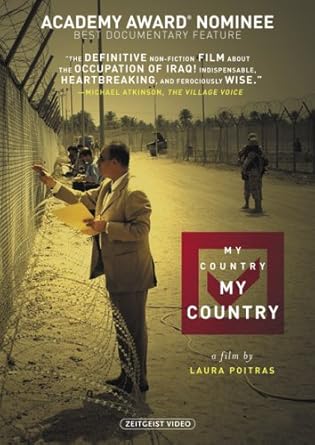My Country, My Country
 Directed by Laura Poitras
Directed by Laura Poitras
Reviewed by Martin Tsai
A documentary on Iraq’s 2005 election, Laura Poitras’ My Country, My Country presents a viewpoint too rarely seen in the slew of news coverage and other documentaries on the war that ravaged nation. Unlike Gunner Palace, The War Tapes and The Ground Truth – which all spotlight American troops – Poitras’ film follows the six-month campaign trail of a Sunni candidate running for the Governorate Council of Baghdad.
An all-around nice guy, Dr. Riyadh goes out of his way for patients at the Adhamiya Free Medical Clinic, even lending money to a woman whose husband is unemployed. Although he is critical of American secularism, Riyadh believes that it's crucial for his fellow Sunnis to participate in the election so they can have their say in the all-important drafting of the constitution.
Chaos is still ubiquitous in Baghdad two years after the U.S. invasion, when the docu is set. There’s no water or electricity as shootings and bombings continue. At the Abu Ghraib Prison, an inmate has stayed for over a year without getting a hearing, while another is only nine years old. Inspecting the prison, Riyadh can only shrug his shoulders and say to the grumpy inmates: “We’re an occupied country with a puppet government. What do you expect?”
Just three months before the election, the U.S.-led Fallujah offensive leads to the decision by Riyadh’s Iraqi Islamic Party to withdraw all of its candidates. With the deadline for withdrawal already past and the ballots printed, Riyadh continues to rally the Sunnis’ vote amid much resistance. One of his family members says: “Politics are not good for you. You do more good as a doctor for us and other people.”
My Country is a possibly unprecedented story, told almost entirely from the Iraqi perspective. Riyadh’s tale is fascinating, especially when seen alongside those of the U.S. soldiers related in the numerous other documentaries on the Iraq War. This engrossing film unfolds with captivating dramatic tension, which builds all the way up to the climactic election day.
Riyadh’s journey allows Poitras tremendous access into areas mostly untapped by Western journalists, such as a meeting of Iraqi Islamic Party members. She counterbalances Riyadh’s views by featuring vignettes involving U.S. military personnel, U.N. officials, Australian security subcontractors, Kurdish militia, etc.
The documentary still appears to be somewhat one-sided since even the seemingly pro-Bush Kurds criticize the fact that things are not getting better under the U.S. occupation. In one very telling digression, a U.S. official tells the Iraqi election police that they have “the front row of one of the best shows that are gonna be in the world.” Then an election policeman with a puzzled look raises his hand and asks “Election for show?” Riyadh in another scene asks someone whom she’d vote for, and she flatly replies “Saddam Hussein”.
The film comes off a bit like Secret Ballot, due to its focus on Riyadh’s tireless promotion of democracy. Unfortunately, My Country fails to fully illustrate its political backdrop. The docu clocks in at only 90 minutes, so there would seem to have been ample room for a more expansive take. Poitras doesn’t really explain where the Sunnis fit in relation to the Kurds, the Shia, the Arabs and the Turks. Another problem is the film's conclusion, which could be somewhat misleading to viewers who haven't closely follow the news.
Even so, despite shortcomings, My Country is essential in venturing into new fertile grounds that arguably no journalists or filmmakers have previously explored.
Reprinted from EmanuelLevy.com. © Copyright 2006 Martin Tsai. All rights reserved.



